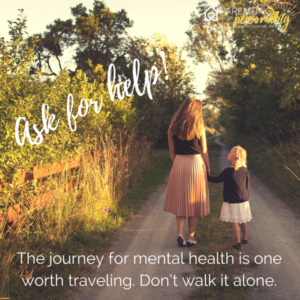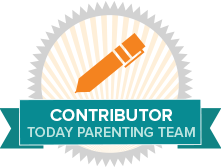Mental Health.
There seems to be a bit of a stigma surrounding those two words, yet many don’t realize the extent to which people are truly affected by them. May is Mental Health Awareness Month. So, I thought I’d take the opportunity to shed a little light on mental health.
[clickandtweet handle=”” hashtag=”” related=”” layout=”” position=””]One in five Americans have a mental health condition. It’s time we start understanding the true impact of mental health.[/clickandtweet]
Effects of poor mental health on everyday situations
She stared at her baby but felt nothing. This is nothing like she imagined. Life felt horribly hard, and she felt like maybe her family would be better off without her. She wasn’t sleeping well, eating well, or doing anything she used to enjoy.
– – – – – – – – – – –
She winced at the very thought of visiting the zoo with her kids. She could feel her heart beat faster and began to hold her breath. What if they got lost? What if someone kidnapped them? What if they got loose and ran into an animal cage like that story from the news? No, there’s no way. She couldn’t do it.
– – – – – – – – – – – –
As hard as she tried, the incident kept running through her head. How could it bother her after so much time had passed? She rarely talked about it, but knew it was the beginning of something that would haunt her for life. It woke her sometimes at night. It intruded upon even moments that were good and calm. As hard as she tried to put away the thoughts, ideas, feelings, sights, sounds…it seemed to find her and come rushing back. It took her breath away…it was stealing the life from her.
– – – – – – – – – – – –
He couldn’t shake the feeling. He wasn’t ever going to be good enough. Life was never going to feel better. It didn’t matter if it was work or home, he couldn’t do it. He needed just a little escape from the overwhelming sense of dread. This offered just a little reprieve. He was sure no one knew, and he wouldn’t continue forever, just until things started feeling less stressful.
These are just a few little examples of how life can be affected when there are mental health issues.
What is Mental Health?
[clickandtweet handle=”” hashtag=”” related=”” layout=”” position=””]Mental health refers to our social, emotional, and psychological well-being, and it is a consideration from childhood until our life is over.[/clickandtweet]It impacts the way we think, feel, respond, and act. It is also a factor in how we deal with relationships, understand ourselves, handle life stressors, and make decisions.
[clickandtweet handle=”” hashtag=”” related=”” layout=”” position=””]Mental health impacts how you see, feel, and experience life. It’s okay to ask for help![/clickandtweet]
What can contribute to mental health issues?
Many factors can play into mental health. A few of the most common ones include:
- Biology—the chemistry of our brains and bodies
- Life Experiences—trauma, abuse, life stressors, etc.
- Genetics—family history or genes that contribute
How do you know if you or someone you care about has mental health issues?
They are actually, quite common, but many people don’t know what to look for. You or a person you care about may be suffering from a mental health issue if you notice any of the following early warning signs.
- Change in sleep pattern, too much or too little
- Change in appetite, eating too much or too little
- Avoiding people or activities once enjoyed
- Experiencing low energy or no energy
- Unexplained aches or pains
- Yelling, arguing and fighting with friends and family
- Mood swings that cause upset in relationships
- Feeling numb or like nothing really matters
- Experiencing hopeless or helpless feelings
- Engaging in drug or alcohol use in excess (includes smoking)
- Having thoughts that feel intrusive (memories or ideas that won’t go away)
- Feeling an increased level of confusion, anger, fear, worry, anxiety, forgetfulness, or irritability
- Hearing voices that don’t exist
- Believing something that you would not have believed or thought true prior
- Inability to complete tasks like showering, taking medication, or self-care
- Unable to care for others or operate in job setting as usual
- Having thoughts of harming self or others
- Focusing on ways to escape, hide, run away, or get rid of the pain
- Thoughts of death looming
- Suicidal thoughts or plans
If you or a person you care about is suffering from any of the above, getting help is important. Mental health problems are common, and you can get the help you need to feel better or even recover completely.
What are some common issues that people seek help for?
Some people know what they need help with and may seek help for anxiety, depression, PTSD (post traumatic stress disorder), eating disorder, bipolar, psychosis, addictions, and many other diagnoses. But often, they seek help because of things that don’t feel right, like relationship conflicts, communication issues, grief, loss, life transitions, tragedies, trials, or other life stressors that are weighing them down. These things may be causing them to not function as they used to, maintain as they need, or be able to just enjoy life fully.
Why is Mental Health Important?
Mental health is important because it contributes to us engaging in healthy relationships, understanding ourselves, coping with life stressors, being productive in work settings, and contributing in positive ways to others lives. It helps us live out our dreams and purposes. It engages us in the life we truly we want to live.
Where do I go from here?
This is where many people get stuck! I like to think of it this way. If you had a problem with your eyes, you would not seek a professional that deals with feet! If you have issues with diabetes, you wouldn’t see a dentist. You would seek a professional that would help balance the organ or issue within your body related to the diabetes. Likewise, when you have something that is not working right with your mental health, it is important to see a professional that deals with that particular area. Some mental health issues relate to imbalances, and just like with diabetes, your body may need some help to balance things out. You may choose to see one of the following:
- Psychiatrist or psychiatric nurse practitioner who would diagnose and prescribe medication
- Psychologist who offers testing and assessing to diagnose the problem and treat with methods other than medication
- Professional counselor (often called therapists) who will work with you in understanding the problem and learning strategies to cope or treat (without the use of medication or standard testing)
The route you choose to take is a personal decision. Just take action! Don’t sit and wait for things to improve. Be proactive and seek help while the issues are still manageable.
We wouldn’t blame a diabetic for seeking help! There should be no shame in seeking help for mental health either.
If you’d like more direction in seeking help, please feel free to refer to my free checklist for finding a counselor/therapist. Professional counselors do not prescribe medication but are able to help refer you to someone who can if that is what you need.
If you would like to know a little more about some of the mental health issues, visit MentalHealthAmerica.net. There you will find more useful information, including a helpful screening for some of the most common mental health problems.
http://screening.mentalhealthamerica.net/screening-tools
Most importantly, it is important to know
[clickandtweet handle=”” hashtag=”” related=”” layout=”” position=””]you are not alone.[/clickandtweet]
Reach out for help and don’t suffer in silence!
If you need immediate help, please contact your local ER. And if you are having thoughts of harming yourself, please call this national suicide prevention lifeline 800-273-8255 (TALK).






